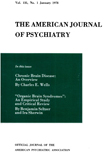Can psychiatry police itself effectively? The experience of one district branch
Abstract
The growing demand by consumers and government for greater accountability from psychiatry is challenging the traditional system of self-policing by which the profession's standards of ethical conduct are established and maintained. The authors describe the operations of a district branch ethics committee, including types of complaints recieved, investigatory procedures, disposition of cases, and factors limiting the committee's effectiveness. They conclude that in some cases lack of funds, lack of time, and the use of peers to judge alleged misconduct make unbiased and thorough evaluation of complaints difficult. They suggest that psychiatry must take steps to improve public confidence in its ability to police itself so that the power to regulate professional conduct will remain within the profession.
Access content
To read the fulltext, please use one of the options below to sign in or purchase access.- Personal login
- Institutional Login
- Sign in via OpenAthens
- Register for access
-
Please login/register if you wish to pair your device and check access availability.
Not a subscriber?
PsychiatryOnline subscription options offer access to the DSM-5 library, books, journals, CME, and patient resources. This all-in-one virtual library provides psychiatrists and mental health professionals with key resources for diagnosis, treatment, research, and professional development.
Need more help? PsychiatryOnline Customer Service may be reached by emailing [email protected] or by calling 800-368-5777 (in the U.S.) or 703-907-7322 (outside the U.S.).



